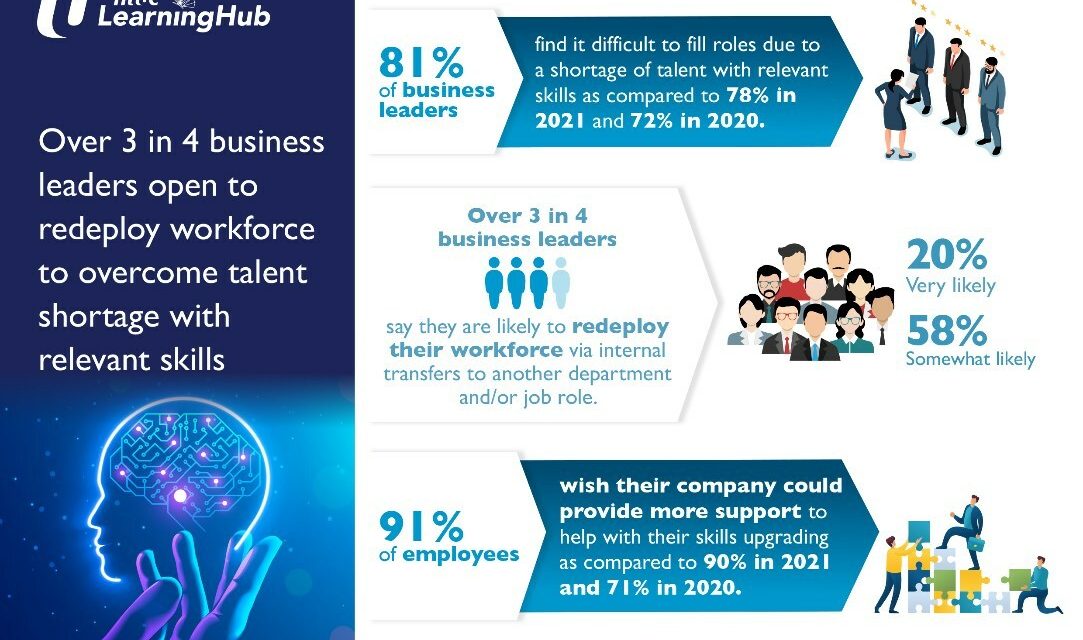81% of business leaders find it difficult to fill job roles due to a talent shortage with relevant skills as compared to 78% in 2021, and 72% in 2020. Over 3 in 4 business leaders (78%) are likely to redeploy their workforce via internal transfers to another department and/or job role. 77% of employees are open to undertake a new job role within the organisation, with opportunities for growth and development without leaving the organisation (63%) and building diverse skill sets (52%) as the top reasons. In fact, 91% of employees want more support from their company to help with their skills upgrading. Over 3 in 4 business leaders (18% very likely, 55% somewhat likely) reveal that their organisation is likely to increase training budget.
A majority of business leaders (81%) find it difficult to fill job roles due to talent shortage with relevant skills, in contrast to 78% in 2021 and 72% in 2020. To address this talent crunch, over three in four business leaders (20% very likely, 58% somewhat likely) are likely to deploy their workforce via internal transfers to another department and/or job role.
Employees are receptive to explore new pathways in job hunting as more than three quarter (77%) are open to undertake a new job role within the organisation, with opportunities for growth and development without leaving the organisation (63%) and building diverse skill sets (52%) as the top reasons. In fact, about nine in ten employees (91%) want more support from their company to help with their skills upgrading in comparison to 90% in 2021 and 71% in 2020.
These are some of the key findings from the recently launched Future Jobs and Skills Report 2023. Based on a survey of 650 working professionals encompassing employees and business leaders, the report explores a dual perspective on the current job market, in-demand jobs and skills, and the training landscape in Singapore.
Over three in four business leaders (18% very likely, 55% somewhat likely) reveal that their organisation is likely to increase training budget. However, there are more business leaders (84%) who perceive that their organisation has placed greater emphasis and investment in workforce skills development as opposed to employees (66%). In fact, there are more employees showing interest to attend training for skills development (93%) as opposed to business leaders who do send employees for training (78%).
Employees cite limited support or guidance from their company (30%) alongside lack of time (48%) and training programmes not being fully funded by their company (35%) as the top challenges they face when upskilling. As they call for more support with skills development, employees express that they most desire for on-the-job training (50%), training offered by external training providers (47%), and free training resources for self-study (45%).
Commenting on the survey findings, Sean Lim, Chief Human Resources Officer at NTUC LearningHub says, “The rise of Industry 4.0 alongside the digital, care and green economies is reshaping industries and resulting in intense competition for top talent. This necessitates an increase in investment in employee training and skills development. Employers can leverage the accessible and affordable programmes available and tap into various funding schemes by the government as they reskill or upskill their existing employees to take on new and/or redesigned job roles. To successfully overcome the talent crunch, employers must also consider building a holistic support system by balancing organisation needs with employee-centricity. This means having open dialogues with staff, listening and catering to their needs when training them. By fostering a culture of continuous learning, companies can ensure their workforce remains agile, capable and prepared for the challenges and opportunities of tomorrow.”
To download the Future Jobs and Skills Report 2023, please visit https://www.ntuclearninghub.com/future-jobs-skills-2023. To find out more about the courses, training and grants, visit NTUC LearningHub’s website at www.ntuclearninghub.com.









